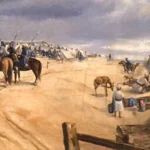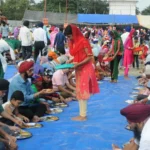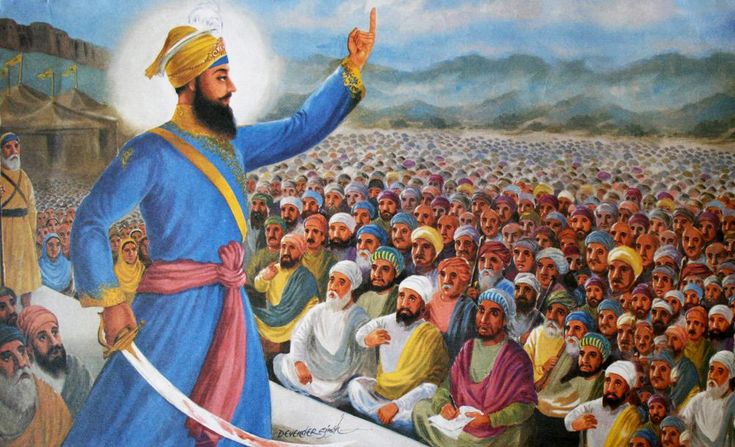Sikhs have sewa in their DNA. This is why, anytime and wherever a problem has been exacerbated, the community sprang forth to assist. There would be several instances of Sikhs helping others in times of distress without regard for their well-being, both in India and overseas. They were fed to keep their stomachs full.
The same sentiment is now being felt in Ukraine, a foreign country. People from the Sikh community are rushing to the battleground to distribute langar and serve the people. The services are being provided without any selfish motives, but rather to save mankind as a whole.
In Ukraine, langar is currently being cooked by members of the Sikh community, which is then brought by train and distributed to various locations. Passengers on trains are also served at the same time. As soon as the battle in Ukraine began, individuals withdrew held in checking and savings accounts and hurried to the supermarkets to buy rations in quantity, which they then kept in their houses.
So that he didn’t have to leave the house during the war, and he didn’t have any problems eating or drinking while staying there. However, due to widespread restrictions, the stores there have been deserted.
Those who have migrated there to educate or who have left home to work there are having a difficult time. He is suffering since he is unable to store food items owing to a shortage of room. The Indian government is also attempting to remove the stranded residents from the area. The initiatives of the Sikhs have offered immense assistance to the folks residing there in such a condition.
Regardless of state, country, or group, Punjabis and Sikhs are famed for their religious services during difficult times. Amid a war-like scenario in Ukraine as a result of Russia’s’military actions,’ the Sikh community is attempting to assist people by conducting a ‘Guru Ka langar’ on a train in Ukraine.
Ravinder Singh, the founder and CEO of Khalsa Aid, shared the video on Twitter, writing: “Guru Ka Langar on a train in Ukraine. The gentlemen were fortunate enough to be able to board this train, which is travelling from the east to the west of Ukraine (to the Polish border). Several students from various nations have benefited from Hardeep Singh’s Langar support. What a character.”
The Sikh faith emphasises the importance of selfless service to others. The Sikh faith recognises that all creatures are one and that living in peace requires living in harmony with one another.
Seva is a Sanskrit word that signifies “selfless service,” or service performed without regard for personal gain. Charity, according to Sikhs, must not be given to gain God’s favour; rather, it must be offered out of a sincere desire to serve others, an act that draws one closer to God. Guru Nanak preached that everyone possesses divinity, thus supporting one another is assisting God.
Every day, Sikhs recite the Ards, the third section of which is known as “sarbat da bhala,” which signifies “blessings for all.” The Sikh notion of sarbat da bhala is a yearning for everyone to flourish, which a Sikh prays for selflessly every day. Seva should not be done for the sake of receiving a reward; instead, it is part of one’s responsibility as a human to do goodwill for others and society.
Guru Nanak taught that God is present in everyone, and hence serving others is serving God. In tandem with the greater culture, he pushed his disciples to live regular, caring lives. Humanitarian efforts and seva devotion to the wider community, particularly to those who are less wealthy or neglected, is a primary objective set for all Sikhs.
Sikhism’s motto is “service to humanity.” It’s a knot that binds us to each other, or better, to the Guru. It opens the individual consciousness to the cosmic consciousness’ expanding nature. In truth, Guru Nanak Dev Ji instructed the Sikhs to help the less fortunate, the suffering, and the downtrodden. This service can be for the benefit of humanity’s societal, physical, spiritual, or security needs.
Guru Nanak Dev Ji began the Seva by building Dharamsalas and distributing free Langar to all people regardless of caste, colour, or creed.
Sikhism’s beliefs forbid a Sikh from acting as a benefactor to the needy. It emphasises that the Wand Chhakna concept should be regarded as Shukrana of the Creator. The Sikh must believe that it is his responsibility to help the impoverished, sick, and needy. He ought not to be proud of his role as benefactor and guardian of the less fortunate. So these are the Sikh Gurus’ teachings, which they have followed for generations and will continue to do so in the future.








